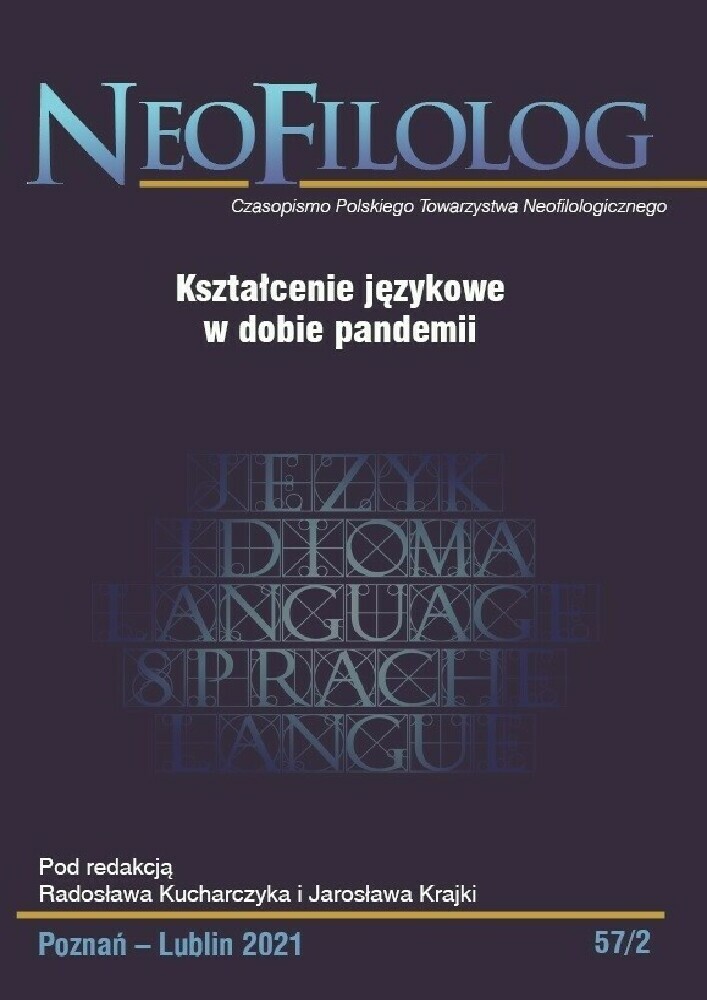Abstract
At the end of the first semester of the 2019/2020 academic year, we conducted an opinion survey of 50 philology students on their willingness to adopt new pedagogical approaches based largely on digital media. We measured the degree of appreciation of different forms of academic work, including lectures, tutorials and seminars, modified by these approaches. After a year of the COVID-19 pandemic, we investigated the potential revision of views on the practical application of the innovations described in 2020. Our research focused on appreciating the usefulness and effectiveness of the teaching methods analyzed during the initial research, judged through the prism of current experiences.
References
Amyotte L. (1996), Méthodes quantitatives. Application à la recherche en sciences humaines. Québec : Éditions du Renouveau Pédagogique.
Corvet-Biron M. (2015), Les MOOCs, nouvelle vraie ou fausse bonne idée ? [en ligne], URL : https://www.speakenglishcenter.com/les-moocs-nouvelle-vraie-fausse-bonne-idee/, consulté le 9 mars 2021.
Eude T. (2021), Banque d’activités d’enseignement-apprentissage : Thierry Eude, Cours magistral en formation comodale [en ligne], URL : https://www.enseigner.ulaval.ca/ressources-pedagogiques/banque-d-activites-d-enseignement-apprentissage-thierry-eude, consulté le 2 avril 2021.
Jean S. (2021), Maintenir la concentration des apprenants durant un cours en vidéo-conférence. Quelques idées pour repenser ses interventions. [en ligne], URL : https://cursus.edu/articles/43973/maintenir-la-concentration-des-apprenants-durant-un-cours-en-video-conference, consulté le 21 mars 2021.
Grzega J., Schöner M. (2008), The didactic model LdL (Lernen durch Lehren) as a way of preparing students for communication in a knowledge society. “Journal of Education for Teaching”, 34 (3), 167–175.
Fiorella L., Mayer R. E. (2013), The relative benefits of learning by teaching and teaching Expectancy. “Contemporary Educational Psychology”, 38 (4), 281–288.
Marchand, L., Loisier, J. (2003), L’université et l’apprentissage en ligne, menace ou opportunité, « Revue des sciences de l’éducation » 29 (2), 415–437
Martin J.-P. (2004), Lernen durch Lehren : quand les apprenants font la classe. « Les Cahiers de l’APLIUT », 33 (1), 45–56.
Prensky M. (2001), Digital Natives, Digital Immigrants. “On the Horizon”, 9 (5), 1–6.
Roberge A. (2017), Les MOOC se dégonflent-ils ? Le MOOC serait-il un modèle pédagogique déjà dépassé ? [en ligne], URL : https://cursus.edu/articles/38110/les-mooc-se-degonflent-ils, consulté le 2 mars 2021.
Widła H. (2019), Implementation of IT tools as a method of improving language and communication skills of bi- and trilingual students, “International Journal of Research in E-learning”, 5 (2), 33–48.
Widła H. (2020), Évaluation formative par le biais de pratiques « Lernen durch Lehren destinées aux étudiants de niveau avancé, “Neofilolog”, 54 (1), 155–170.
Widła H. (2021), Intégration du numérique dans quelques pratiques universitaires innovantes en enseignement/apprentissage des langues, (in :) Izert M., Kostro M., Sujecka-Zając J., Szymankiewicz K. (éds), Au croisement des cultures, des discours et des langues. Cent ans d’études romanes à l’Université de Varsovie (1919–2019), t. II (Linguistique et Didactique du FLE). Warszawa : Wydawnictwa Uniwersytetu Warszawskiego, 154–163.
Wilczyńska W., Michońska-Stadnik A. (2010), Metodologia badań w glottodydaktyce. Kraków : Avalon
License
Copyright (c) 2021 Halina Widła

This work is licensed under a Creative Commons Attribution-NoDerivatives 4.0 International License.
Authors
Authors of texts accepted for publication in Neofilolog are required to complete, sign and return to the Editorial team’s office the Agreement for granting a royalty-free license to works with a commitment to grant a CC sub-license.
Under the agreement, the authors of the texts published in Neofilolog grant Adam Mickiewicz University in Poznań a non-exclusive, royalty-free license and authorize the use of Attribution-NoDerivatives 4.0 International (CC BY-ND 4.0) Creative Commons sub-license.
The authors retain the right to the free disposal of the work.
Users
Interested Internet users are entitled to use works that have been published in Neofilolog since 2017, under the following conditions:
▪ attribution – obligation to provide, together with the distributed work, information about the authorship, title, source (link to the original work, DOI) and the license itself.
▪ no derivatives – the work must be preserved in its original form. Without the author's consent, it is not possible to distribute the modified work in the form of translations, publications, etc.
Copyrights are reserved for all texts published since 2017.
Miscellaneous
Adam Mickiewicz University in Poznań retains the property right as a whole (layout, graphic form, title, cover design, logo etc.).

